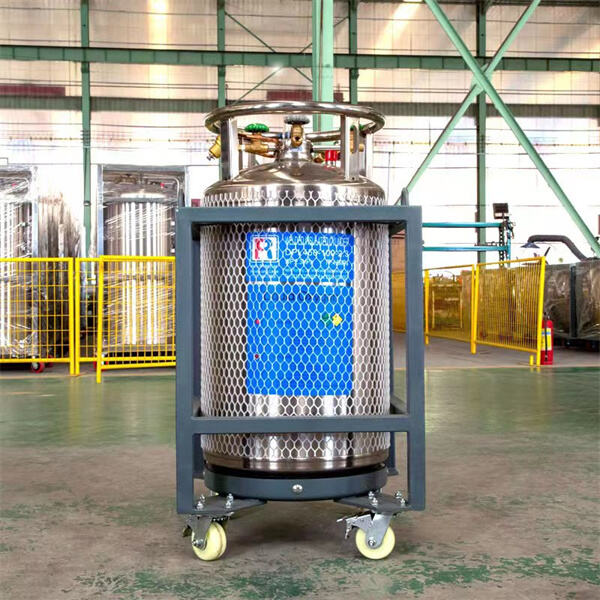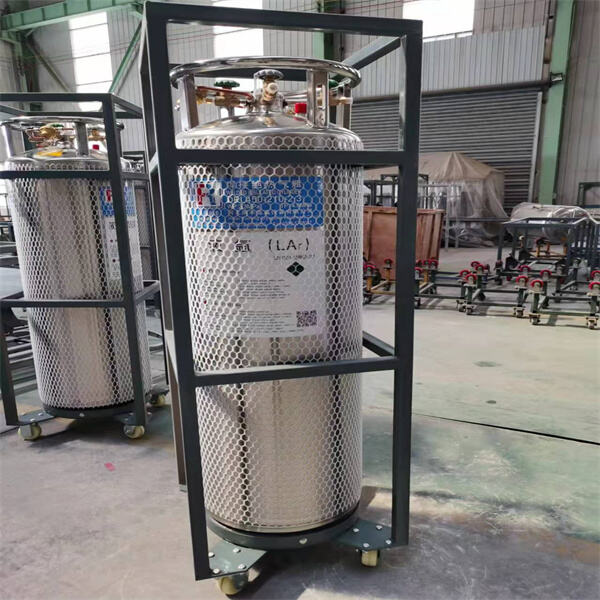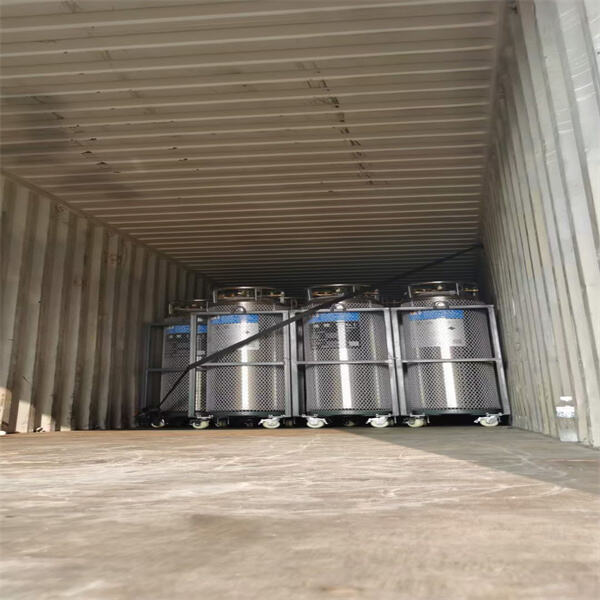Cryogenic dewars are important devices that have applications in the handling and storage of very cold materials like cells, tissues or other biological samples used for scientific research. These are special types of containers which can rehydrate and retain the temperature below zero to keep your sample safe in all kinds of conditions during the experiments or study.
The most significant benefit of using cryogenic dewars is the fact that it keeps samples at tip top quality over a long period. Maintained at cryogenic temperatures, biomass samples can stay viable for much longer than they would under normal storage conditions. This is especially vital for rare or important samples, which could be difficult to replace should they go lost or suffer damage.
Furthermore, when storing with cryogenic dewars samples are kept under an even environment for optimum long- term storage. Having a steady temperature inside the dewar allows researchers to safely say that every sample is being stored at the same conditions. This ensures that results are being collected in a uniform manner and removes all extraneous variables (outside things which could alter the result of an experiment) out, thus keeping data more accurate and reliable.
New innovations are continually being developed in the field of cryogenic dewars, providing state-of-the-art advancements to improve their effectiveness and performance. A recent advancement in this sector includes the use of superconductors, which aim to improve dewars even further.
Superconducting crynogenic dewars utilize a combination of liquid helium and active cryocoolers to be able to reach such low temperatures. This technology has many advantages over traditional dewars, cooling at a much faster rate while maintaining precise temperature control that utilizes less energy.
One more interesting development in cryogenic dewars technology is application of RFID (radio-frequency identification) tags for sample tracking and monitoring. These tags are small enough to be attached directly onto individual samples and provide real-time information the sample's location, whether is has experienced excessive temperatures in transit or storage. The system tracks samples to ensure they are handled and stored under the appropriate conditions, providing researchers with information that can be used for future experimentation.

Cryopreservation (the freezing of biological materials for future,long-term storage) is highly dependent upon the use of cryogenic dewars to establish a stable and uniform environment in which such samples are stored. In other words, cryoprotectants are special chemicals added to samples before frozen that may aid in the preservation of cells and tissues during freezing. Cryogenic dewars know how to keep everything the way it should be in terms of low temps and cryoprotection, preserving samples correctly.
The second equally important component is how FAST the sample can be frozen (the leading cryoprotectant class of glass forming agents provide both protection and speed). Rapid freezing limits cellular harm from occurring, while gradual arrest of the most profound essence much slower can become less ice eyes on high art structures. Cryogenic dewars are designed for quick freezing, optimal sample preservation and cell viability in preparation of all future research.

Portable cryogenic dewars are commonly used in medical environments, to the extent that many biological samples and vaccines can now only be stored or transported using this mode. These containers provide a lot of benefits to traditional storage, being mobile, safe and allow you get work done faster basically.
Portability, with the major benefit of portable cryogenic dewars on wheels making these systems to be carried away from one place site into other remote sites. This portability is particularly useful in remote medical-care-limited areas where personnel can collect and store the samples taken from patients.
Additionally, portable cryogenic dewars also offer increased safety over traditional storage techniques. These are properly insulated containers, which not only store but also during transportation maintain sub-zero temperatures to protect the longevity and viability of samples required in order to receive accurate and reliable test results.

In space exploration, cryogenic dewars are crucial for the storage and handling of fuels and materials that spacecraft need to function. These vessels are so good at keeping cold in space that they have become an integral part of any deep-space mission, ensuring the success and longevity of most missions to distant locales.
The most common use of cryogenic dewars in space is the storage of liquid hydrogen and oxygen as rocket fuel. By keeping these fuels at cryogenic temperatures, they are stored as liquids able to be effectively used over long distances of interstellar border.
In space, cryogenic dewars store and transport biological samples for examinations of how space affects living organisms or with the hope to discover extraterrestrial life.
As space exploration continues, the importance of cryogenic dewars is expected to grow. Further Technological advancements will provide even more opportunities and the ability to travel deep into space, enable us to explore new cosmic frontiers in depth.
AGEM recognizes that each customer require different things in the field of specialty gases, such as calibration gas. We provide customized solutions to meet our clients' specific needs. If you require a specific purity quantity, cylinder size or packaging options, AGEM can work with you to tailor their products according to your precise requirements. This degree of customization will ensure that you get the best calibration gas cylinder for your applications which will improve overall efficiency and performance. AGEM's product range is not restricted to calibration gases. The catalog of AGEM comprises Hydrocarbon Gases, Halocarbons, Chemical Gases and Rare gases. You can be sure that AGEM to have the specific kind of gas you require.
AGEM provides a variety of cryogenic cylinders, which can handle common super-cooled liquids and gases like liquid oxygen, argon carbon dioxide, nitrogen and Nitrous Oxide. We employ imported valves and equipment to ensure top performance. Gas saving devices are utilized and gas overpressure gas is given priority within the gas phase area. Double safety valve provides solid assurance for safe operation.We have a variety of cryogenic cylinders, which can house common super cooled liquids:Full Volume: 80L/100L/175L/195L/210L/232L/410L/500L/1000LWork Pressure: 1.37MPa/2.3MPa/2.88MPa/3.45MPaThe Inner Tank Design Temperature : (-196Shell Tank Design Temperature : 50oC+20oCInsulation: Multi-layer wrapped vacuum insulationStored Medium: LO2, LN2, LAr, LCO2, LNG
Leaks of cryogenic dewars is an extremely serious issue. We check for leaks over five times to ensure that the tank is of high quality. We have a complete production line and strict quality control and also a system of after-sales service. Our system ensures that customers get top-quality products. We pride ourselves on our dedication to high-quality and excellent customer service. Our team of skilled professionals is always ready to assist with your needs, making sure that all of your needs are met to your satisfaction. What makes us stand out is our 24/7 available service. We're there for you 24/7, every day of the week.
AGEM has been operating in Taiwan for over 25 Years. We have a deep R and D expertise in this area, and we can provide unique understanding in the areas of Speciality, Bulk, and Calibration Gases for six distinct regions.Taiwan - Kaohsiung City (Headquarters, R and D Center)India - Mumbai, Vadodara, Coimbatore, Pune, Bengaluru, DelhiChina - WuhanMiddle East - Dubai (UAE) and Kingdom of Saudi ArabiaUnited Kingdom - CambridgeThe gas solutions we offer comprise Technical Consulting. Assembling & Commissioning. Sample Testing. Packing & Shipping. Drawing Design. Manufacturing.